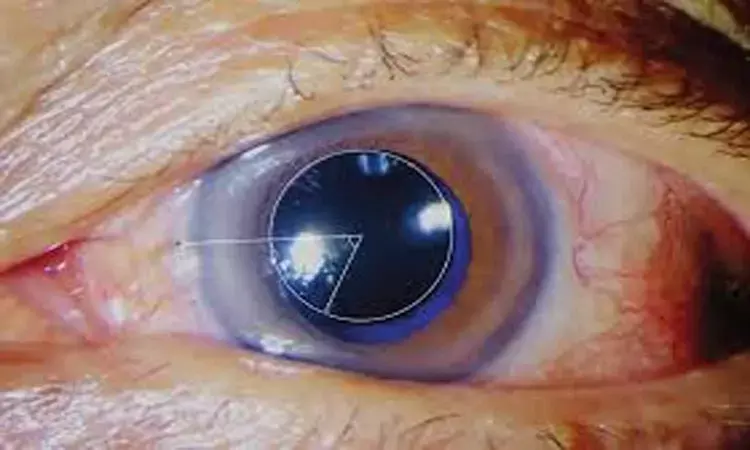- Home
- Medical news & Guidelines
- Anesthesiology
- Cardiology and CTVS
- Critical Care
- Dentistry
- Dermatology
- Diabetes and Endocrinology
- ENT
- Gastroenterology
- Medicine
- Nephrology
- Neurology
- Obstretics-Gynaecology
- Oncology
- Ophthalmology
- Orthopaedics
- Pediatrics-Neonatology
- Psychiatry
- Pulmonology
- Radiology
- Surgery
- Urology
- Laboratory Medicine
- Diet
- Nursing
- Paramedical
- Physiotherapy
- Health news
- Fact Check
- Bone Health Fact Check
- Brain Health Fact Check
- Cancer Related Fact Check
- Child Care Fact Check
- Dental and oral health fact check
- Diabetes and metabolic health fact check
- Diet and Nutrition Fact Check
- Eye and ENT Care Fact Check
- Fitness fact check
- Gut health fact check
- Heart health fact check
- Kidney health fact check
- Medical education fact check
- Men's health fact check
- Respiratory fact check
- Skin and hair care fact check
- Vaccine and Immunization fact check
- Women's health fact check
- AYUSH
- State News
- Andaman and Nicobar Islands
- Andhra Pradesh
- Arunachal Pradesh
- Assam
- Bihar
- Chandigarh
- Chattisgarh
- Dadra and Nagar Haveli
- Daman and Diu
- Delhi
- Goa
- Gujarat
- Haryana
- Himachal Pradesh
- Jammu & Kashmir
- Jharkhand
- Karnataka
- Kerala
- Ladakh
- Lakshadweep
- Madhya Pradesh
- Maharashtra
- Manipur
- Meghalaya
- Mizoram
- Nagaland
- Odisha
- Puducherry
- Punjab
- Rajasthan
- Sikkim
- Tamil Nadu
- Telangana
- Tripura
- Uttar Pradesh
- Uttrakhand
- West Bengal
- Medical Education
- Industry
Retinal vein occlusion can increase the risk of dementia, finds study

Dr. Ga Eun Nam and associates from the Department of Family Medicine, University College of Medicine, Korea has found that the risk of developing dementia was high in patients with retinal vein occlusion (RVO).
Findings have been published in the American Journal of Ophthalmology.
Though studies have associated Retinal vascular change with changes in the brains of patients with dementia; however, there is limited evidence regarding the relationship between retinal vein occlusion (RVO) and the risk of dementia.
With this background, researchers investigated the association between RVO and subsequent risk of dementia using a cohort comprising the entire Korean population.
The study design was a retrospective cohort type and was based on the data of participants ≥40 years who underwent health examinations between 2009 and 2010 provided by the South Korean National Health Insurance Service. The RVO group (n = 46,259) comprised patients who were initially diagnosed between 2006 and 2010; the comparison group (three per RVO patient; n = 138,777) was selected using propensity score matching according to age, sex, and systolic blood pressure.
Key findings were-
- In a follow-up of 6.6 years, 14,727 cases of dementia developed.
- From the Kaplan-Meier curves, incidence probabilities for all types of dementia were significantly increased in the RVO group, relative to the comparison group (all log-rank P <0.001).
- After adjusting for all confounding variables, the RVO group exhibited increased risks of subsequent all-cause dementia (HR, 1.16; 95% CI, 1.12-1.21), Alzheimer's disease (1.15, 1.11-1.20), and vascular dementia (1.24, 1.12-1.37) relative to the comparison group.
From the results of the study, the authors observed that-
- Retinal vein occlusion (RVO) was associated with an increased risk of dementia.
- The coexistence of RVO with hypertension was associated with a higher risk of dementia.
- RVO may be a predictor of dementia.
The authors concluded that the presence of RVO was significantly associated with increased risks of all three types of dementia both in hypertensive and non-hypertensive individuals.
For detailed reading, log on to https://doi.org/10.1016/j.ajo.2020.07.050
Dr Satabdi Saha (BDS, MDS) is a practicing pediatric dentist with a keen interest in new medical researches and updates. She has completed her BDS from North Bengal Dental College ,Darjeeling. Then she went on to secure an ALL INDIA NEET PG rank and completed her MDS from the first dental college in the country – Dr R. Ahmed Dental College and Hospital. She is currently attached to The Marwari Relief Society Hospital as a consultant along with private practice of 2 years. She has published scientific papers in national and international journals. Her strong passion of sharing knowledge with the medical fraternity has motivated her to be a part of Medical Dialogues.
Dr Kamal Kant Kohli-MBBS, DTCD- a chest specialist with more than 30 years of practice and a flair for writing clinical articles, Dr Kamal Kant Kohli joined Medical Dialogues as a Chief Editor of Medical News. Besides writing articles, as an editor, he proofreads and verifies all the medical content published on Medical Dialogues including those coming from journals, studies,medical conferences,guidelines etc. Email: drkohli@medicaldialogues.in. Contact no. 011-43720751


